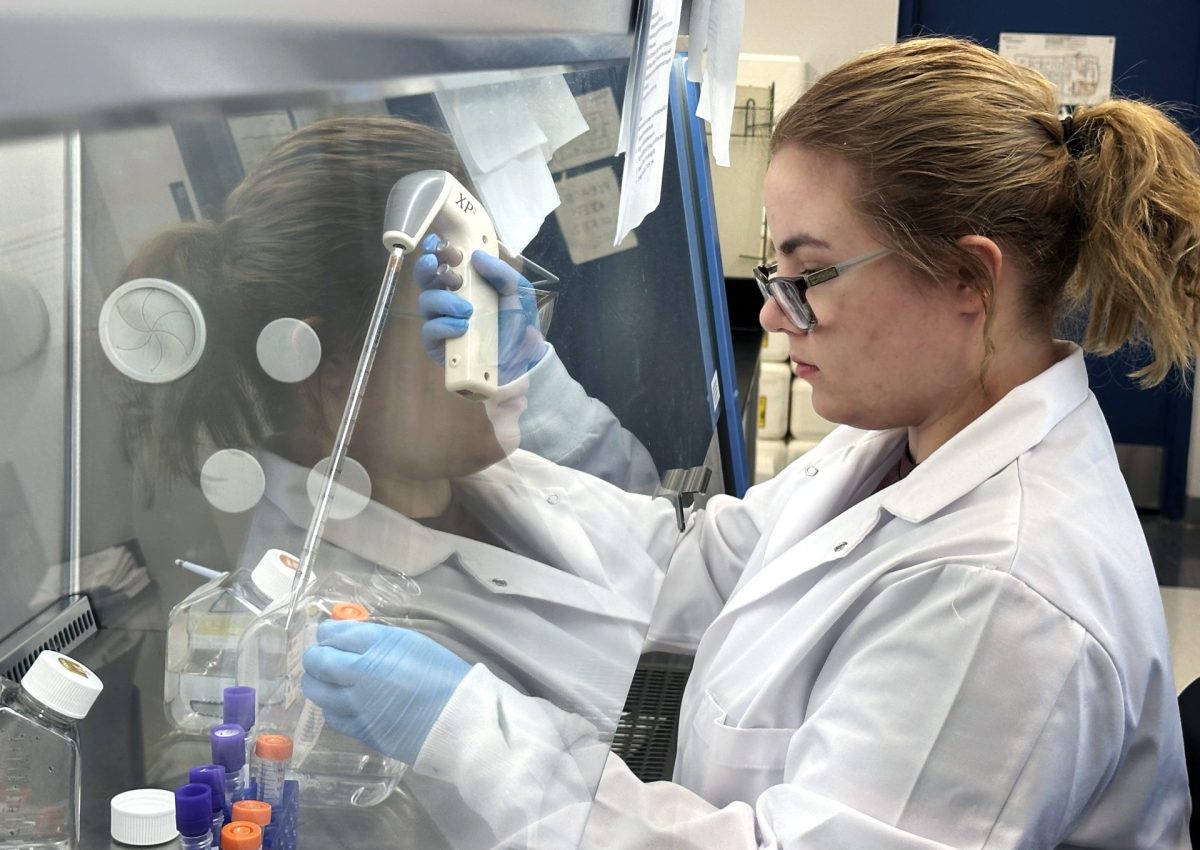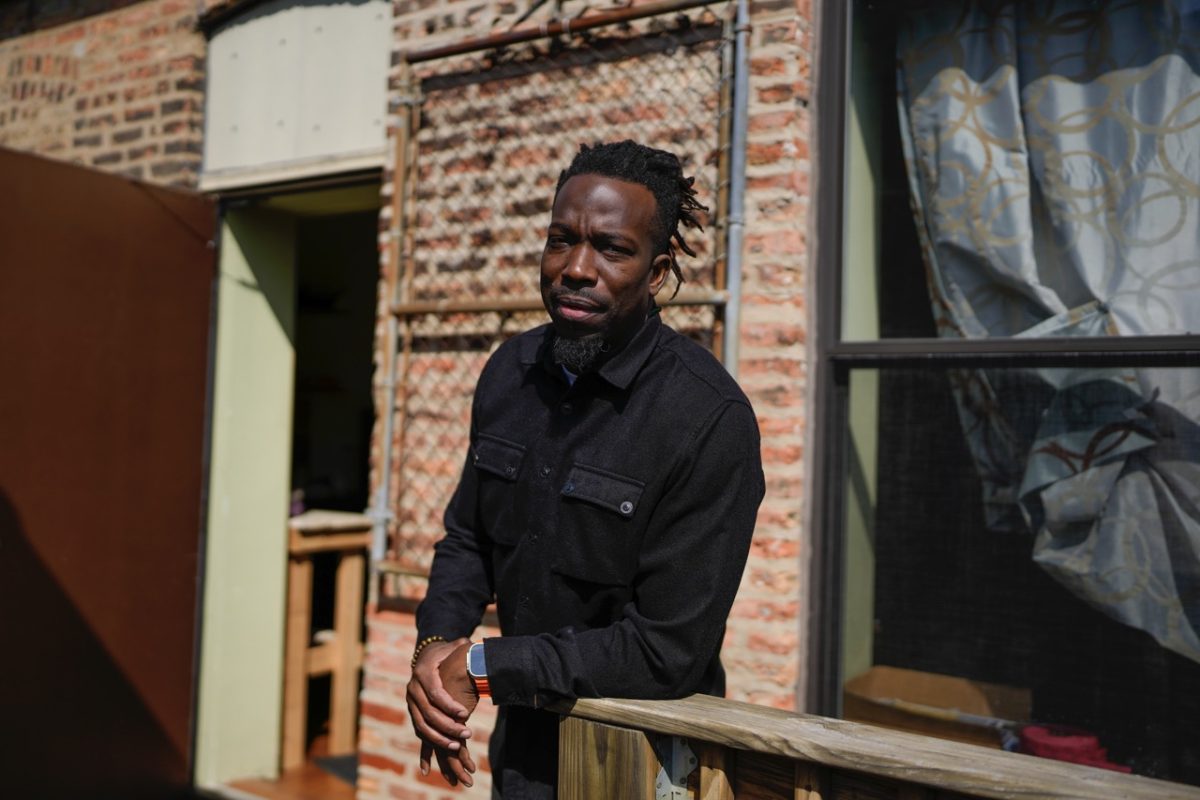Aug. 17 began like any other day for Alice Butler-Collins. She got up and heard her son – Kenneth Collins, a DePaul Ph.D. student – start his car after a few misfires and drive away. That was at 6:45 a.m.
At 7:45 a.m., she received a phone call from the Roseland Community Hospital where her son worked. She was informed that her son had been in an accident.
Butler-Collins called her daughter and drove with her to the hospital. When they arrived, they noticed several police cars and the entrance to the hospital was blocked off. Not long later, it was confirmed that her son had died.
“It was just complete shock,” said Butler-Collins. “Just shock. There wasn’t anger. It was just disbelief, shock, a lot of crying and just completely ‘this can’t be happening.'”
Collins, 43, died on his way to pick up his paycheck after a car hit him from behind when the driver fell asleep at the wheel.
Collins was born and raised in Chicago. As a child, he was “high energy” and “fun-loving.” Butler-Collins described him as an “adventurous, talkative, sort of a daredevil type” who wasn’t afraid to do anything. “You know, (a) tough little boy,” said Butler-Collins.
Collins studied at Western Illinois University, Olive-Harvey Junior College and Chicago State University before coming to DePaul. Collins entered first as a graduate psychology student and later in a Ph.D. program.
He once worked as a corrections officer for Division I of the Cook County Jail system, where he witnessed something that deeply upset him. “He got tired of seeing all of the men locked up and not happy and able to really have hope,” said Alicia Penn, Collins’ fianc’ÛΩe. “He grew frustrated with that work environment, and he felt like if he went back to school to work with adolescents and youth, maybe he could help prevent them from getting to that point when they’re minors and do still have a chance to turn their lives around.”
Penn has warm recollections of Collins. They planned on getting married later this fall and have been together since December 2006. The Chicago Tribune and ABC7 News wrote that Collins was planning to use his paycheck on an engagement ring. Collins also rented a new house for the couple and Penn’s 10-year-old daughter which they planned on moving into earlier this month.
“I have a lot of fond memories. He was a jokester. Sometimes a sarcastic jokester too but he had a huge heart and a huge personality,” said Penn. “What he was doing at Roseland was his dream job. That was exactly what he wanted to do – to be in a position where he could have a positive impact on struggling youth. He was very happy.”
It’s been a sad month for Penn, but she and her daughter have been coping. They are in the process of meeting with a grief counselor. “He already joined our lives together,” said Penn. “He was a daily presence. I really miss him.”
Penn, a registered nurse, said Collins was very passionate about the youth and that they shared that passion.
ξ
Turning his Passion into a Career
Butler-Collins truly believed that DePaul had trained Collins well for his career path. “He always really felt that his coursework here totally prepared him for everything he had to do,” said Butler-Collins.
While working as a researcher for a juvenile justice institute at the University of Illinois, he interviewed people who had been incarcerated to see what could help prevent it. From there, his interest in the field of psychology and criminal justice shifted from corrections to prevention.
Butler-Collins said the program Collins was in at DePaul was “critical” in teaching him the proper techniques used in diagnostic and therapeutic work for becoming a youth counselor at Roseland Community Hospital.
“I think he was the only person in the class who had really grown up in the Chicago urban area, gone to school and knew more about the actual things that go on in the high schools and colleges,” said Butler-Collins. She believes this made it easier for young people to listen to his message, especially since he had worked inside the jail system.
Butler-Collins said Collins felt African-American men were automatically racially profiled. In an essay Collins wrote, he explained how he believed that at the “heart of every young African-American male there burns a fire.”
Collins worked by using creative ways to reach them to reach young people, so Butler-Collins said her son was excited to work in Chicago’s urban areas. She said he was very outgoing and knew how to engage people.
“He would use books and poetry and things that really engaged the students and their interest,” said Butler-Collins. “It’s because he believed that things could get better that he could work with young people, who some people would say were ‘at risk’ children or kids that life was going to be hard for, because he believed in God. He believed that we as individuals can make a better life for other people. And he felt that he had the ability and the skills to do that.”
Penn referenced one case in particular where she knew Collins had truly made a difference in his field with a child he was working with.
“There was an incident where [a patient] had to be calmed down,” said Penn. “At the end of it, once she was calm and she was able to process, she said that no adult had ever sat down and talked to her. I believe this girl was about fifteen (or) sixteen, and she said no adult had ever sat down and talked to her for that long and gave her advice or tried to help.”
“It shouldn’t be that way,” said Penn.
People will remember Collins most for his experience and dedication, but for Penn, she will remember him differently.
“Oh, his love for me,” said Penn. “It’s a really good feeling when you really know that somebody really loves you, truly. And he did. And he made sure I knew it.”
Collins’ body was cremated and his mother held a memorial service in his name. She wanted it to be a time of “prayer and meditation” for his family and friends.
Several people, who had known Collins from childhood to his DePaul years from his church to his fraternity, spoke at the memorial and remembered the good things.
“People will simply miss him,” said Butler-Collins.
Though Butler-Collins said many people have been comforting and have been providing hope for her by sending cards and visiting, she still admitted that her son’s death was something she was not prepared to deal with.
“No one anticipated this,” said Collins. “You go to the grocery store and you think, ‘Oh I’m going to get this for Kenneth.’ You see a big, 6’5” African-American male that sort of looks like him…you hear a car that’s misfiring and the muffler’s not that great,” said Butler-Collins, with a touch of humor.
Butler-Collins said she is “trying to trying to reconcile (with) reality” and that “it’s like something was pulled out of (her) – it’s a void…an empty space.”
She said that Collins may not have been perfect, but he possessed many good qualities. She said that in his professional life, he really did try to make a difference. “I think his faith kept him with a positive attitude about trying to continue to make things better,” said Butler-Collins. “That he’s trying to continue to work with people who have a lot of challenges in their lives…he did not want to see anybody else locked up in a jail if it wasn’t necessary. And he loved to have fun.”
A memorial fund in Collins’ name has been set up at Roseland Community Hospital to go to a young person whom the social workers feel is turning their life around – a person who they feel needs a boost. If you would like to donate to the scholarship, you can make donations by writing a check to Roseland Community Hospital. On the memo line, write “Kenneth Edward Collins Scholarship Fund” – mail checks s/o Alice Butler-Collins 9228 s. Claremont Avenue Chicago, Il 60643.







